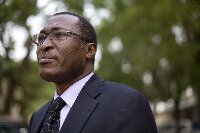From Mali: `We have a lot of control now’
 Dr. Salif Samake |
Part seven of the 8-part series In the Driver’s Seat: A Series on Country Ownership of Health Programs. Dr. Salif Samake is Director of Planning and Statistics for Mali’s Health Ministry.
Q: How important is country ownership of health programs in Mali?
A: To me, country ownership is crucial to achieve the development goals. All the support given by partners should help the country become better organized and conduct its own development. Countries cannot be just a place to capture support for donor countries and move on their agenda.
Q: What has been the problem in the past?
A: Before we had a lot of project management. Much of the support came into the country under the project process. This means that the government is not all the time in the driver’s seat to conduct all these projects. Sometimes you feel that you are in the drivers’ seat, but it’s not true. If you look carefully, donors managed most everything. It’s in everyone’s interest to get everything integrated. Then we can be mutually accountable.
Q: What about fears that this process will lead to more corruption?
A: I don’t agree with this assumption. For me, if we want to support development, we have to make sure a country has a strong plan and a strong process. The best way to do development is to build the country process. If the country process is weak, we have to help the government build capacity and reinforce procedures to make sure things are working well. Everything has to be based on the national process. If not, you create parallel processes.
We can have external audits, with all the partners together having the same audit. We can do joint assessments together. If a partner doesn’t agree, we can talk. But at the end of the day, we all agree we have to move forward.
Q: Are you wasting a lot of time now reporting to multiple donors?
A: We have a lot of control of our programs now. We have perhaps 80 percent or more control of our programs. A lot of new partners are coming to Mali and progressively we are integrating them in this process. Our key partners are on board with us. Just recently, we had a visit from USAID headquarter level here in mission, related to the Global Health Initiative, and all our discussion was around how to work on the common goals of the national health plan, using the same policy framework, the common indicators, having common audits, and having all the donors’ budgets coming through our health system.
We now are working on a Joint Health Systems Funding platform. We have 14 partners on this platform, including the European Union. We need a critical mass of partners so we can build something and fully reduce the financial mechanisms. We are in negotiations now. It will take a little time. You can’t just abolish 100 procedures and come to one procedure suddenly.
Q: Will more country ownership make a big impact on MDG goals?
A: Yes. Country ownership puts the country in the driver’s seat and makes more coherence and more integration possible. It also can give partners more confidence that programs are working. We will be getting rid of duplications. This cannot help to achieve results. If this movement of country ownership is in place, it means that civil society clearly knows its role and plays the game as it has to play it. The private sector is doing the same, the NGOs are doing the same. If all these things are well linked in a country and every player is playing the game as we agreed this means there is real ownership. Ownership is not just on the government side -- it’s all the stakeholders, with the government leading, working together.
In the Driver’s Seat: A Series on Country Ownership of Health Programs.
Part 1: WHO's Chan: 'Some countries are angry'
Part 2: Shah: 'We want real outcomes in health'
Part 3: Ethiopia’s Tedros: No ownership, no scale
Part 4: Wisman: Donors need to `take a little risk’
Part 5: Omaswa from Uganda: `Donors want a controlling say’
Part 6: From Nepal: `We build step by step’
Part 8: Sturchio: 'The focus should be on outcomes'
Photo Credit Dominic Chavez
Keyword Search
MLI works with ministries of health to advance country ownership and leadership. This blog covers issues affecting the ministries and the people they serve.
Connect with Us
![]()
![]()
Categories
Blogs We Like
- Africa Can End Poverty
- Africa Governance Initiative
- Behind the Numbers
- CapacityPlus
- Center for Global Health R&D Policy Assessment
- Center for Global Development: Global Health Policy
- Center for Health Market Innovations
- Global Health
- Global Health Hub
- Global Health Impact
- The New Security Beat
- PAI Blog
- RH Reality Check
- Save the Children
- Transparency and Accountability Program
Contact Us
Please direct all inquiries to

Comments